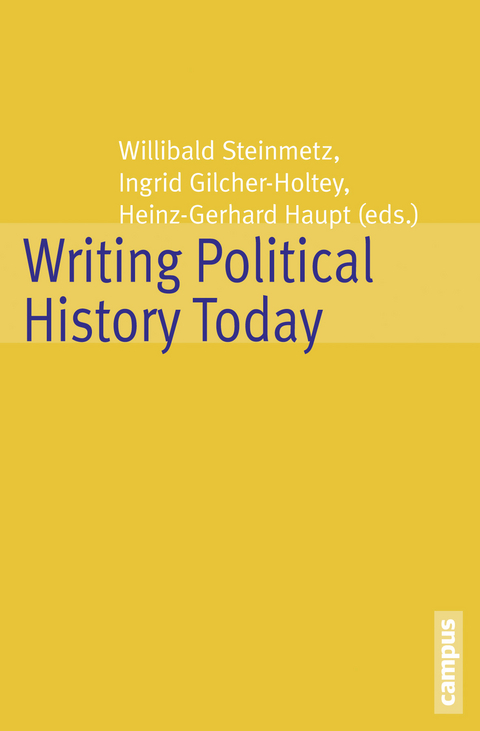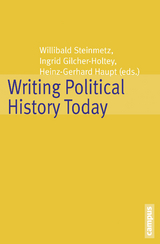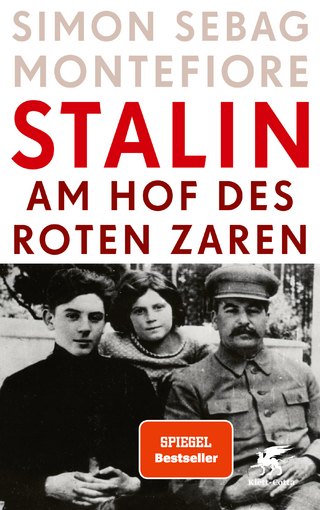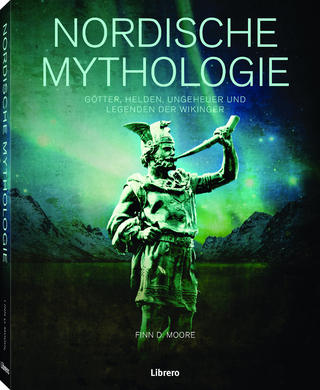Writing Political History Today
Die neue Politikgeschichte hat die enge Definition von »Politik« hinter sich gelassen. Die Autorinnen und Autoren des Bandes verstehen das Politische als einen dynamischen Kommunikationsraum, dessen Grenzen und Inhalte beständig ausgehandelt werden - durch verbale, symbolische und teils auch gewalthafte Kommunikation. Diese Grenzziehungen und Kommunikationsformen werden an ausgewählten Beispielen dargestellt, um schließlich die Frage zu beantworten, was auf der Agenda einer künftigen historischen Politikforschung stehen sollte.
Willibald Steinmetz ist Professor für moderne Politikgeschichte, Ingrid Gilcher-Holtey Professorin für Zeitgeschichte an der Uni Bielefeld. Heinz-Gerhard Hauptlehrte Geschichte an der Uni Bielefeld und am Europäischen Hochschulinstitut Florenz.
Contents
I. Introduction
The Political as Communicative Space in History: The Bielefeld Approach - Willibald Steinmetz and Heinz-Gerhard Haupt
II. Contested Concepts: "Politics" and "the Political"
Introduction - Willibald Steinmetz
From "Interest" to the "Political": Speaking of Ruling and Reigning in Early Modern Europe - Martin Papenheim
From a Despised French Word to a Dominant Concept: The Evolution of "Politics" in Swedish and Finnish Parliamentary Debates - Pasi Ihalainen
What Did They Mean by Política? Debating over the Concept, Value, and Place of Politics in Modern Spain - Javier Fernández Sebastián
Navigating Around Politics: British Progressive Thought and the "Political" in an Expanding Transnational Perspective - Michael Freeden
III. Boundary Disputes: The Political and Other Spheres
Introduction - Heinz-Gerhard Haupt
Drawing Boundaries between Politics and Religion: Early Modern Politics Revisited - Matthias Pohlig
Political Economy and Statistics in the Late Ancien Régime - Lars Behrisch
Laws as the Basis and Object of Political Communication - Christoph Gusy
Depoliticalisation of the Private Life? Reflections on Private Practices and the Political in the Late Soviet Union - Kirsten Bönker
Moving across Boundaries: Rudolf Virchow between Medicine and Politics - Tobias Weidner
IV. Violence: Means, Object or End of Political Communication?
Introduction - Ingrid Gilcher-Holtey
"Catholic and Breton Forever": Violence and the Visual in Early Twentieth-Century France - Eveline G. Bouwers
The Limits of the Legitimate: The Quarrel over "Violence" between Autonomist Groups and the German Authorities - Freia Anders and Alexander Sedlmaier
Vie chère, Violent Protest, and Visions of Protection: The Vie chère Controversy on the Eve of WWI in France (1905-1914) - Marcel Streng
V. Epilogue: Moving beyond the "New" Political History
Writing Political History after the "Iconic Turn" - Bettina Brandt
The Political, the State, and Governance: Reflections on Essentially Contested Concepts - Thomas Risse
Historical Politics Research - Luise Schorn-Schütte
The Opening Up of Political History - Henk te Velde
Political History Matters: Everyday Life, Things, and Practices - Frank Trentmann
Notes on Contributors
The Political as Communicative Space in History: The Bielefeld Approach
Willibald Steinmetz and Heinz-Gerhard Haupt
Political History and its Discontents: Towards a New Consensus?
There was a time when political history was declared outdated by promi-nent members of the historical profession in most Western countries. The high point of the assault on political history was reached in the 1970s and 1980s under the double blow of, first, social history, and second, cultural history. It is true that the traditional topics of political history - the rise and fall of nations, the making and unmaking of constitutions, the strategies of political parties, the encounters between great leaders and the people, in short: the business of government - continued to dominate teaching in schools and universities as well as TV documentaries and popular text-books. However, although still an important subject, this kind of conven-tional political history had lost much of its former attraction by the 1970s, especially among younger scholars. The slackening of interest was due partly to the fascination exerted by new and until then largely unexplored fields such as gender history, the history of the body and sexuality, or the history of marginal and subaltern groups. Furthermore, critics were dis-satisfied with the unresponsiveness of traditional political historians to new methods and approaches such as comparison, discourse analysis, or the study of images. At times, these discontents culminated in more funda-mental calls for a paradigm shift in the entire discipline. Politics, it was claimed, was only a dependent variable in the historical process. The real forces shaping long-term developments were assumed to be either socio-economic "structural" constraints, or the mentalities and sign systems that - together - make up the "culture" inhabited by the historical agents and informing their beliefs and behaviour. Political history, the critics argued, had to be dethroned from its top position, because social history, or respectively cultural history, possessed much more explanatory potential.
The French historians of the Annales school were among the earliest, and most outspoken, opponents of political history. They not only refused the positivistic traditions of French republican history, but struggled against the priority of politics in historical writings in general. As Jacques Le Goff stated in 1978 - nearly fifty years after the founding of the Annales journal - the fight was not over yet: "Detrôner l'histoire politique, ce fut l'objectif numéro un des Annales, et cela reste un souci de premier rang de l'histoire nouvelle." Not surprisingly, this massive challenge caused angry reactions and a stiffening of attitudes with some practitioners of old-style political history, whereas it encouraged others, in France and elsewhere, to promote revisions and apply new concepts to the historical study of politics. Thus, René Rémond, historian of the French Right, coordinated a volume defending political history in 1988 in which he defined its goal in almost Weberian terms: to study the political as an "activité qui se rapporte à la conquête, à l'exercice, à la pratique du pouvoir." And Jacques Julliard, historian of the French Left and labour movement, directed the attention of historians to the "strategies of actors in the face of historical necessities" and stated that "in modern societies, the interrelations are sufficiently numerous to give birth to events, institutions, and even structures that are sufficiently complex for the word 'political' to remain the only one capable of describing them." Political history as a history of structures, not just events, became conceivable.
From another angle, cultural history in France was particularly productive in questioning the practice of political history. Important works on political culture, such as Mona Ozouf's study on revolutionary celebra-tions (1976), as well as a sustained
| Erscheint lt. Verlag | 16.5.2013 |
|---|---|
| Reihe/Serie | Historische Politikforschung ; 21 |
| Co-Autor | Freia Anders, Lars Behrisch, Kirsten Bönker, Eveline G. Bouwers, Bettina Brandt, Javier Fernández-Sebastián, Michael Freeden, Ingrid Gilcher-Holtey, Christoph Gusy, Heinz-Gerhard Haupt, Pasi Ihalainen, Martin Papenheim, Matthias Pohlig, Thomas Risse, Luise Schorn-Schütte, Alexander Sedlmaier, Willibald Steinmetz, Marcel Streng, Henk Te Velde, Frank Trentmann, Tobias Weidner |
| Verlagsort | Frankfurt |
| Sprache | englisch |
| Maße | 141 x 213 mm |
| Gewicht | 514 g |
| Themenwelt | Geisteswissenschaften ► Geschichte ► Allgemeines / Lexika |
| Geisteswissenschaften ► Geschichte ► Geschichtstheorie / Historik | |
| Schlagworte | Europa • Historische Politikforschung • Kommunikation • Politikgeschichte |
| ISBN-10 | 3-593-39806-0 / 3593398060 |
| ISBN-13 | 978-3-593-39806-8 / 9783593398068 |
| Zustand | Neuware |
| Haben Sie eine Frage zum Produkt? |
aus dem Bereich




